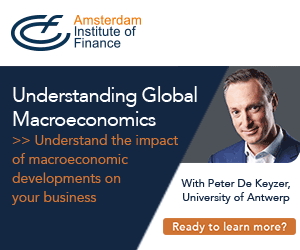We might be glued to our devices for the latest developments on Brexit, or the news on the Trump impeachment hearings, or an update on the ongoing trade disputes between China and the US. But in our interest in the daily minutiae, we often fail to see the full picture, with its complexities, connections and ramifications.
“People who are able to see the bigger, more intricate picture will have an edge over people who simply react to the news headlines in knee-jerk fashion,” says economist Peter De Keyzer. “The world is not a simple place. In this increasingly interconnected world, management decisions depend on both macro developments and policy decisions. Domestic as well as foreign.”
People who are able to see the bigger, more intricate picture will have an edge over people who simply react to the news headlines in knee-jerk fashion
Economist Peter De Keyzer
It’s this simple observation that is the basis of the 2-day course Understanding Global Macroeconomics that Peter Keyzer conducts at Amsterdam Institute of Finance. It will help you to see the world through a different lens and understand its impact on your business.
De Keyzer uses the example of Brexit and the EU to illustrate his point. “If you want to know whether the Eurozone will survive, it won’t help you to read every bit of daily news. You have to understand the underlying issues around economic integration. In the Eurozone we have far-reaching economic integration. Essentially, we have countries abandoning their currency and part of their sovereignty to pool risk. Brexit means having more sovereignty, but also more risk. For decades we’ve learnt that more trade integration is a good thing, resulting in fewer boundaries and lower transaction costs. We’ve called that globalization. But there’s a feeling that certain people – the workers in the Midwest of the US, some parts of the middle class in the UK, for example – have been left behind by globalization. We are seeing a push back against globalization, and the rise of protectionism, more state-interference and strong-man politics as a result.”
The bigger picture
The program introduces participants to the key concepts and policy debates in macroeconomics, including monetary policy and fiscal policy, demography, trade policy, inequality and more, and helps them think strategically about them.
“It is not a matter of B happens because of A,” says De Keyzer. “There are different processes at work – scientific, economic, geostrategic, demographic, political, technological – these are non-linear, and they react with each other. This course gives a strategic overview and helps participants to construct logical relationships between the major macroeconomic variables.”
It is this interconnectedness that has always intrigued De Keyzer and what drew him to the field of economics, first in academia, and then to asset management, to Chief Economist, and then as founder and managing partner of Growth Inc., a Belgian-based advisory firm concerned with communicating strategically around these issues on behalf of clients.
He says, “I am not a person who likes to know everything about one topic, I always wanted to know a lot about a lot of different topics. There’s hardly a single topic that doesn’t have to do with economics – politics, ideology, trade, how people behave in their daily lives. It’s a way of describing reality and trying to look at underlying patterns.”
The Understanding Global Macroeconomics program is concerned with looking at these underlying patterns through the real-world application of this theoretical knowledge. It is about a 25 percent theory, and 75 percent application. Once the concepts and theoretical insights are introduced, participants are challenged to use them in context to think about the world. Says De Keyzer, “I give them articles from Financial Times or The Economist, or a policy paper or research paper, and ask questions around that. How does this article relate to demography? How does demography relate to monetary policy? What does this mean for China? It’s a kind of Socratic dialogue I like to have with attendants of the course that helps them deepen their understanding.”
Having been exposed to these topics and to ways of thinking about them, participants will view the world through a different lens. “When they see news about Brexit, they should be thinking about globalization and free trade. When they see an article about the Eurozone, they see this is a sovereignty issue, a geopolitical and a geostrategic issue. Overall, they are able to understand the world better and make better decisions.”
